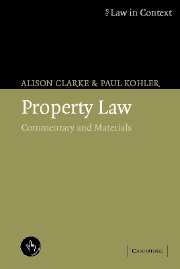Book contents
- Frontmatter
- Contents
- Preface
- Acknowledgments
- Table of cases
- Table of statutes
- Table of statutory instruments
- Table of treaties
- Table of EC legislation
- Part 1 The concept of property
- Part 2 The nature of proprietary interests
- 5 Personal and proprietary interests
- 6 Ownership
- 7 Possession
- 8 Fragmentation of ownership
- 9 Recognition of new property interests
- Part 3 The acquisition and disposition of property interests
- Part 4 Proprietary relationships
- Bibliography
- Index
7 - Possession
Published online by Cambridge University Press: 05 June 2012
- Frontmatter
- Contents
- Preface
- Acknowledgments
- Table of cases
- Table of statutes
- Table of statutory instruments
- Table of treaties
- Table of EC legislation
- Part 1 The concept of property
- Part 2 The nature of proprietary interests
- 5 Personal and proprietary interests
- 6 Ownership
- 7 Possession
- 8 Fragmentation of ownership
- 9 Recognition of new property interests
- Part 3 The acquisition and disposition of property interests
- Part 4 Proprietary relationships
- Bibliography
- Index
Summary
The nature of possession
Introduction
‘Possession’ can be described as the intentional exclusive physical control of a thing. A person who takes physical control of land or goods, with the intention of excluding all others from it or them, acquires possession of it or them as a matter of law. This is the case even if the taking of control was unlawful. So, if a thief steals your book or a squatter moves into your house, possession passes from you to her as a matter of fact and as a matter of law (although it has to be said that the courts have not always been happy to accept this: see section 7.4.1 below). Of course, this unlawful removal of possession from you does not affect your right to possession – you remain entitled to take possession back for yourself (subject to the public order safeguards considered in section 7.4 below) or to ask the court to put you back in possession and/or order appropriate compensation. The fact remains, however, that until you take such a step the taker/squatter is in law in possession.
In Chapter 2, we considered why a legal system might want to adopt such a rule. In this chapter, we look more closely at what amounts to possession, how it fits into the legal taxonomy of property interests, and how it can be acquired, transmitted, lost and regained, as well as at the broader implications of the basic rule that possession confers entitlement.
- Type
- Chapter
- Information
- Property LawCommentary and Materials, pp. 259 - 296Publisher: Cambridge University PressPrint publication year: 2005

